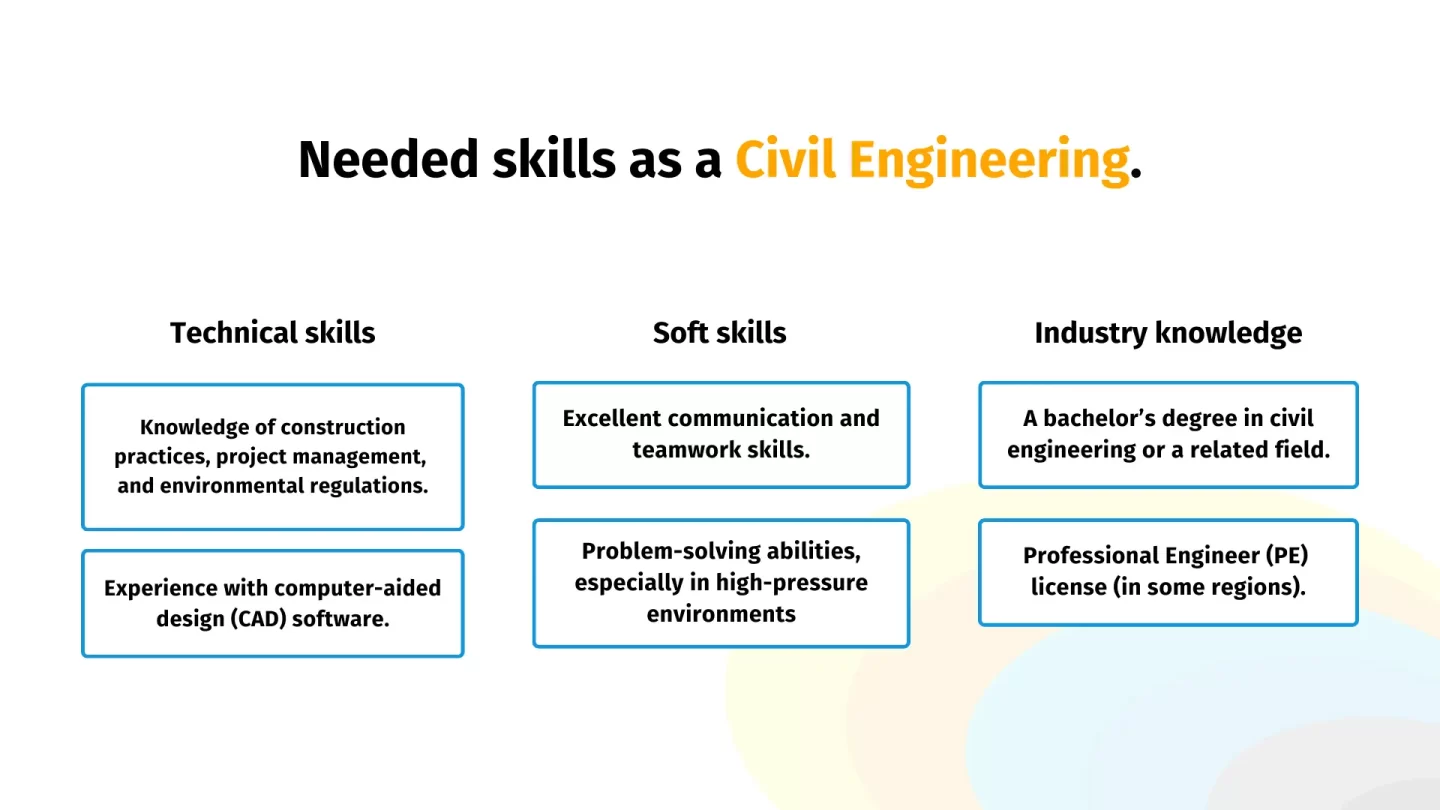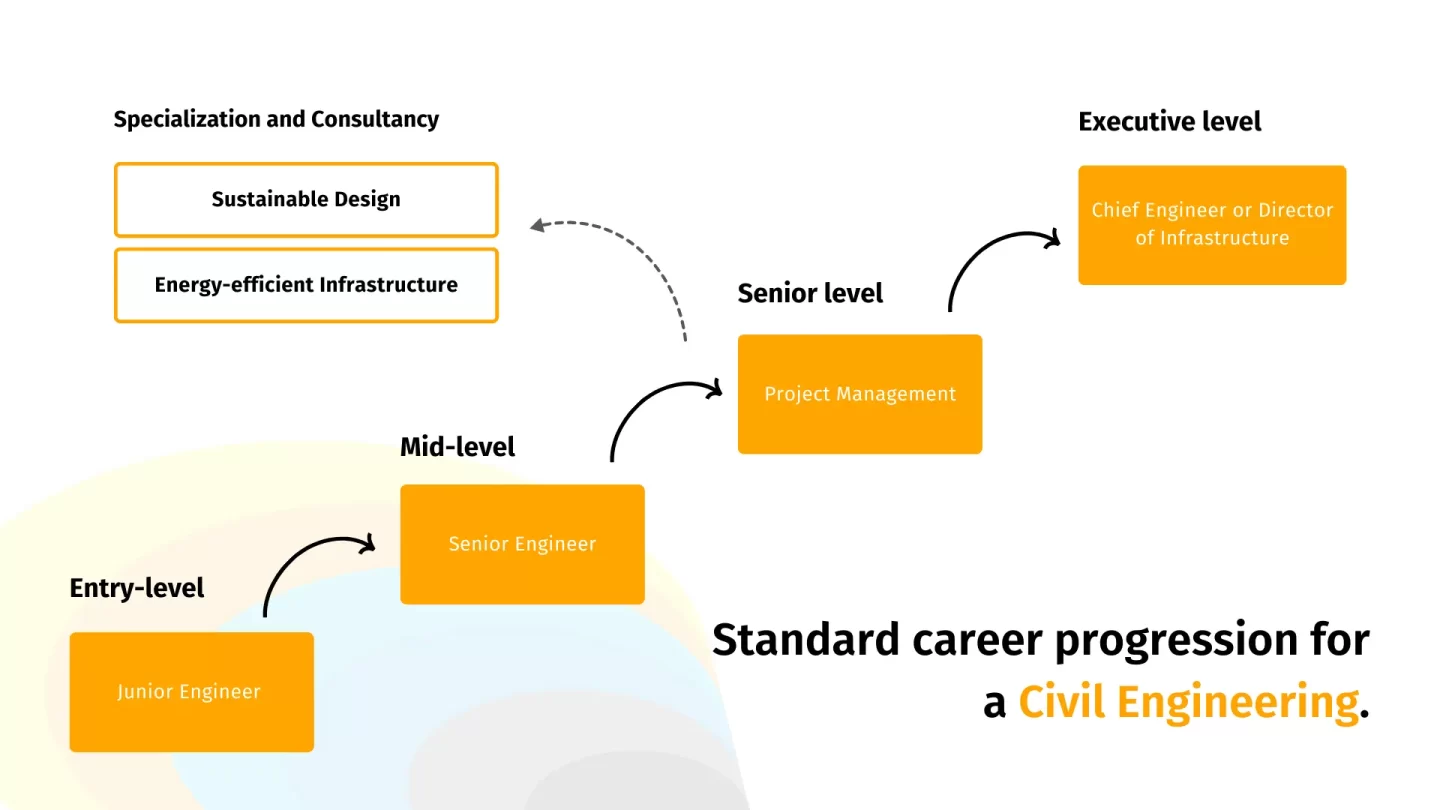Why Work as a Civil Engineer in the Energy Sector?
The energy sector offers civil engineers a dynamic and rewarding career, with opportunities to work on cutting-edge infrastructure projects that directly impact global energy production. From offshore platforms to wind turbines, energy companies rely on civil engineers to design, plan, and oversee the construction of vital structures that ensure safe and efficient energy production.
Choosing a career as a civil engineer in the energy and infrastructure sector allows professionals to work on large-scale, innovative projects that promote sustainable development. The work is both challenging and fulfilling, offering engineers the chance to leave a lasting impact on the industry and the environment.
What is a Civil Engineer?
A civil engineer is a professional responsible for the design, construction, and maintenance of infrastructure projects, including roads, bridges, buildings, and water systems. In the energy sector, they are tasked with developing infrastructure that supports energy production, transportation, and distribution. They work closely with other engineering disciplines, such as mechanical and electrical engineers, to ensure the seamless integration of systems within energy projects.
Civil engineers in this field must possess strong technical knowledge and problem-solving abilities, as they are often required to work in challenging environments, such as offshore oil rigs or remote wind farms.
What Does a Civil Engineer at an Energy Company Do?
Civil engineers in the energy sector have a broad range of responsibilities that go beyond traditional infrastructure development. They are involved in every stage of energy project planning, from feasibility studies and environmental assessments to the final construction and operational phases. Key duties include:
Designing infrastructure that supports energy generation, such as pipelines, platforms, and power plants.
Ensuring compliance with safety and environmental regulations.
Conducting site assessments and preparing detailed engineering plans.
Overseeing construction processes to ensure projects are completed on time and within budget.
Collaborating with other engineers and project managers to integrate civil designs into overall energy systems.
In renewable energy, the focus of the role is on projects like wind farms, solar arrays, and hydroelectric plants, where they design foundations and supporting structures that can withstand environmental stresses.
Salary and Benefits

Civil engineering careers in the energy sector offer competitive salaries and a range of benefits. According to recent industry data, the averages for the United States are:
- Entry-level employees in energy can expect salaries ranging from $60,000 to $80,000 per year.
- Mid-level engineers with several years of experience typically earn between $80,000 and $110,000 annually.
- Senior engineers and managers can command salaries exceeding $120,000, depending on the location and size of the projects they manage.
When looking at other locations like the Netherlands, the average salary ranges from 3,000 to 5,000 EUR per month. In the United Kingdom, a civil engineer can expect to bring home an average that goes from GBP 28,000 to GBP 60,000 per year, depending on the seniority.
In addition to a competitive salary, many energy companies offer comprehensive benefits packages that include health insurance, retirement plans, performance bonuses, and opportunities for further training and development.
Sources: The U.S. Bureau of Labor Statistics (BLS) and the National Society of Professional Engineers (NSPE) provide up-to-date salary figures for civil engineers in various sectors, including energy.
Civil Engineer Skills and Requirements

To succeed as a civil engineer in the energy industry, professionals must possess a specific set of skills and qualifications, including:
- A bachelor’s degree in civil engineering or a related field.
- Professional Engineer (PE) license (in some regions).
- Strong knowledge of construction practices, project management, and environmental regulations.
- Experience with computer-aided design (CAD) software.
- Excellent communication and teamwork skills.
- Problem-solving abilities, especially in high-pressure environments.
Specialized knowledge in areas such as geotechnical engineering, environmental science, or renewable energy infrastructure can also be highly advantageous in securing a role within the energy sector.
Responsibilities of a Civil Engineer
Civil engineers in the energy sector have a variety of responsibilities, including:
Designing and planning energy infrastructure projects.
Conducting risk assessments to ensure the safety and stability of structures.
Ensuring projects meet all regulatory requirements and industry standards.
Collaborating with cross-functional teams, including environmental scientists, architects, and project managers.
Overseeing the construction and maintenance of energy-related structures.
These responsibilities require a deep understanding of engineering principles and the ability to apply them to real-world problems in often challenging environments.
Locations of Civil Engineer Jobs
Roles in the energy sector are in demand worldwide, with significant opportunities in regions with high energy production, including:
- North America: The U.S. and Canada have robust oil, gas, and renewable energy sectors.
- Middle East: Countries like Saudi Arabia and the UAE offer numerous opportunities in oil and gas infrastructure.
- Europe: The UK, Germany, and the Netherlands are key players in both traditional and renewable energy projects.
- Africa: Nations like Nigeria and Angola are major hubs for engineering projects related to oil and gas extraction.
Civil engineers willing to relocate can find exciting opportunities across the globe, often in locations with booming energy industries.
Challenges in Civil Engineering
Working this role in the energy sector comes with its fair share of challenges, including:
Environmental factors
Engineers must often design structures that can withstand harsh climates, such as offshore platforms in the North Sea or solar farms in arid desert regions.
Regulatory hurdles
Navigating complex environmental and safety regulations can be time-consuming and difficult.
Technological advancements
Engineers must continuously adapt to new technologies and methods, such as the integration of renewable energy sources into traditional infrastructure.
Despite these challenges, civil engineers in the energy sector find the work rewarding due to the opportunities for innovation and the significant impact they have on global energy production.
Career Progression and Growth Opportunities

Civil engineers in the energy sector have excellent opportunities for career growth. Starting as junior engineers, professionals can progress to senior engineering roles, project management positions, and eventually executive leadership positions such as Chief Engineer or Director of Infrastructure.
Those with advanced degrees or specialized certifications may also pursue niche areas of civil engineering, such as sustainable design or energy-efficient infrastructure, which are becoming increasingly important as the industry shifts toward greener energy solutions.
Work Environment and Culture
The work environment for civil engineers in the energy sector varies depending on the specific role and location. Engineers may work in office settings overseeing project planning and design, or at construction sites where they manage on-the-ground infrastructure development. Finally, some of them are assigned to remote locations. Here, they work on offshore rigs, wind farms, or desert solar arrays.
The culture within energy companies is often collaborative, with civil engineers working closely with other engineers, environmental scientists, and project managers to ensure the successful completion of projects.
How to Become a Civil Engineer in the Energy Industry
As in many careers, it is expected for the role to fulfill certain requirements. These, in the energy industry, typically requires:
- A bachelor’s degree in civil engineering or a related field.
- Professional licensing (PE) is required in some regions.
- Internships or entry-level roles with energy companies or engineering firms that specialize in energy projects.
Advanced degrees or certifications in energy-related fields, such as renewable energy engineering or environmental sustainability, can enhance career prospects and open doors to higher-level positions.
Benefits of Working as a Civil Engineer
Working as a civil engineer in the energy sector offers numerous benefits:
High salary potential
Civil engineers in energy often earn more than their counterparts in other industries.
Career stability
The energy sector is a critical industry with consistent demand for skilled engineers.
Opportunities for innovation
Engineers in this field work on cutting-edge technologies, particularly in the growing renewable energy sector.
Drawbacks
Like any career, working as a civil engineer in the energy sector has some drawbacks, including:
- Long hours and remote locations: Engineers may be required to work long hours on-site, often in remote or challenging environments.
- High-pressure situations: The need to meet tight deadlines and ensure safety can lead to stressful working conditions.
Despite these challenges, many civil engineers find the benefits outweigh the drawbacks, particularly in terms of career growth and salary potential.

Current Civil Engineer Jobs
Looking for jobs in the energy sector? WTS Energy is always looking for talented civil engineers to fill roles in oil, gas, and renewable energy companies worldwide. Explore our current job openings on our career page and take the next step in your career today!
